NBA hosts Chinese basketball coaches
Updated: 2013-08-21 11:03
By Caroline Berg in New York (China Daily)
|
||||||||
The NBA is investing in developing basketball-player talent in China and the association's CEO for China sees training the country's coaches as a vital part of reaching that goal.
"We have a great relationship with the Chinese Basketball Association (CBA)," NBA China's David Shoemaker wrote in an e-mail reply to questions from China Daily. "We share a commitment to basketball development in China."
In November, the NBA plans to host 12 more Chinese coaches to the US for the organization's annual US-based coach education program. Additional details about this year's exchange are not yet available, Shoemaker wrote.
The NBA has helped train nearly 600 coaches from the Chinese Basketball Association (CBA) over four years. It has also sent 19 of its coaches to China to participate in a coach exchange program.
In previous years, Chinese coaches who have come to the US to train have attended practice and games with the Los Angeles Lakers, the Los Angeles Clippers, the Boston Celtics, the Utah Jazz and the NBA Development League (D-League).
The NBA has cooperated with the CBA over many decades, including hosting the Chinese National team in the US in 1985. The first joint coaching clinic was held in 2004 and led by former New Jersey Nets coach Don Casey. In 2009, the NBA and CBA announced a comprehensive multiyear joint coaching program in Beijing, and in 2012 agreed to expand.
In addition to inviting Chinese coaches from elite professional teams and sports schools to participate in the US-based program, the NBA sends coaches, athletic trainers, strength and conditioning coaches and nutritionists to lecture at the CBA's annual training camps for coaches in China.
"We have translators to assist with communication," Shoemaker wrote. "Over the past three years, our coaches have developed a much greater understanding of the basketball and coaching environment in China, and the program is extremely effective."
According to Shoemaker, the Chinese coaches in the training program will be grouped based on their experience and will receive tailored training. The program for junior coaches will focus on fundamentals, while the senior coaches will receive more advanced training.
"The program curriculum focuses on a few key elements such as individual player development, team management, practice planning/execution and game situations," Shoemaker wrote. "Since the first joint NBA-CBA coaching clinic, we have observed vast improvement in both the players and coaches in the CBA."
Chinese basketball coaches follow International Basketball Federation (FIBA) rules, which Shoemaker said NBA coaches are very familiar with and tailor the program to fit those rules.
Shoemaker said the NBA's strength and conditioning coaches lecture on the importance of diet in sports while keeping in mind the differences of food and supplements available in China.
Notable Chinese coaches who have attended the US training programs include the men's and women's national team head coaches and the CBA Beijing Ducks head coach Min Lulei, who led the team to their first CBA Championship in 2012.
Prominent NBA coaches who have participated in the exchange program include Ron Rothstein of the Miami Heat, Rolando Blackman of the Dallas Mavericks, Terry Stotts of the Portland Trail Blazers, Brian James of the Philadelphia 76ers, Daniel Shapiro of the Sacramento Kings and Herb Brown, former coach of the Detroit Pistons.
The coach education program does not only cater to men. This summer, former head coach of the 2000 Sydney Olympics gold medal winning US women's national team conducted a clinic and lecture series geared toward women coaches from Jiangsu Province in eastern China.
Shoemaker said the NBA continuously reviews and re-evaluates the program to provide practical experiential training that can be applied to the coaching environment in China.
The NBA will work with the CBA to identify and create coaching programs to provide specialized training for both the grassroots and elite level CBA coaches. Shoemaker said this will provide coaches of similar experience the opportunity to get the most out of their training programs with the NBA, which will ultimately allow the NBA to provide even more coaches with the tools necessary to develop elite and youth basketball talent in China.
Although the CBA has been suffering to gain popularity and prominence, especially after the national team's humiliating loss at the recent Asian Championship in Manila, the CBA estimates that 300 million people play basketball in China - roughly the population of the US.
Shoemaker told Variety magazine earlier this summer that NBA China, established in 2008, is having its strongest year ever.
In 2012, the NBA's Chinese website registered 3.3 billion page views, which rose by 34 percent this year to 4.5 billion page views. During the 2012-13 regular season, total online video streams for the NBA rose 169 percent over the 2011-12 season, leaping from 1.2 billion to 3.2 billion.
The NBA has voiced interest in eventually establishing an NBA-affiliated league in China. Until then, the NBA is focused on expanding all aspects of its business model in China, while ensuring all its initiatives are aligned with the Chinese government's goals. This includes the coach-development program.
"We are looking at options to scale the program nationwide in order to provide more Chinese coaches with the opportunity to have access to NBA basketball methods," Shoemaker wrote. "This could mean sending more NBA coaches to more regions in China on a year round basis or using technology as a means to reach a larger audience of coaches."
carolineberg@chinadailyusa.com
(China Daily USA 08/21/2013 page1)
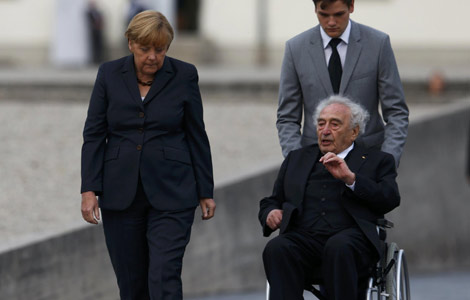
 Merkel makes historic visit to Nazis' Dachau camp
Merkel makes historic visit to Nazis' Dachau camp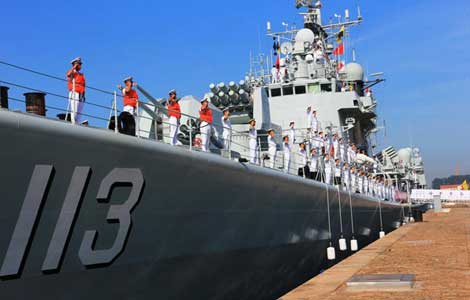
 Chinese fleet sets sail for joint drills
Chinese fleet sets sail for joint drills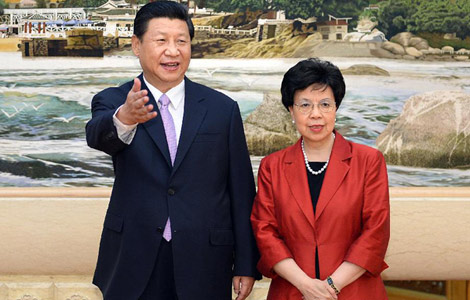
 President Xi meets WHO director-general
President Xi meets WHO director-general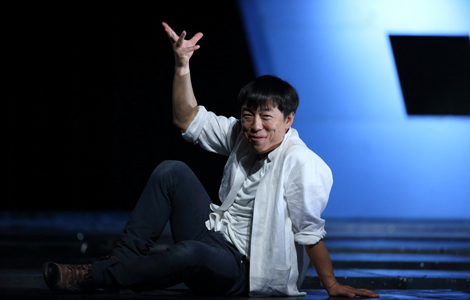
 Everyman movie star
Everyman movie star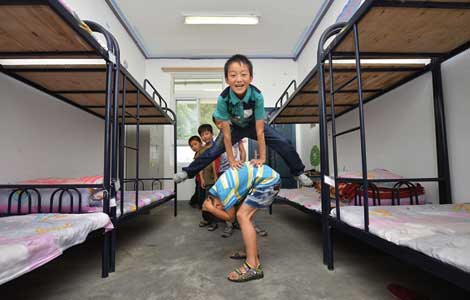
 Rural boarding schools need dorm managers
Rural boarding schools need dorm managers
 Center of hope and support
Center of hope and support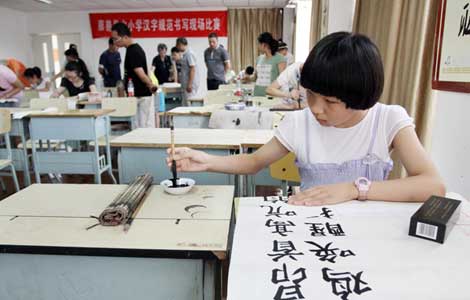
 Chinese characters under threat in digital age
Chinese characters under threat in digital age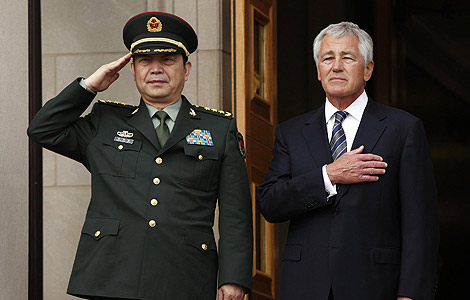
 US, China to expand military exchanges
US, China to expand military exchanges
Most Viewed
Editor's Picks

|

|

|

|

|

|
Today's Top News
China urges US flexibility on N. Korea
China tops US in phone use
NBA hosts Chinese coaches
China asked to help in African mining
Dispute slows positive trend on Korean Peninsula
Food safety tops public's concerns
Chinese fleet sets sail for joint drills
Children with HIV live in fear
US Weekly

|

|







